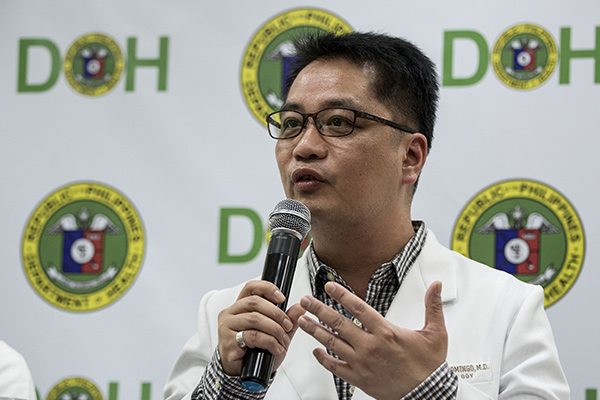Dengvaxia row wreaks havoc on Philippine war on disease
February 4, 2018 | 10:17am

Department of Health Undersecretary Enrique Domingo speaks during a press conference regarding the Dengvaxia vaccine at the DOH headquarters in Manila on Feb. 2, 2018. Widespread fears over a controversial dengue vaccine that some families blame for child deaths is wreaking havoc on the Philippines' war on disease, with parents unwilling get their kids protection from other ailments, a senior health official said February 2. Noel Celis/AFP
MANILA, Philippines — Widespread fears over a controversial dengue vaccine that some blame for child deaths are wreaking havoc on the Philippines' war on preventable diseases, with many parents refusing to get their children immunized, a senior health official said.
Immunization rates for polio, chicken pox, tetanus and other diseases are significantly down from previous years since the government suspended the sale and distribution of the Dengvaxia vaccine in December, Health Undersecretary Enrique Domingo told reporters on Friday.
The government is also investigating Dengvaxia's alleged role in the deaths of at least 14 children who were among the 830,000 who got the vaccine as part of the world's first public dengue immunization program in 2016-2017.
"Our programs are suffering... (Filipinos) are scared of all vaccines now," Domingo said, adding that immunization rates for some diseases are down to 60 percent, significantly lower than in recent years and below the target of 85 percent.
The Philippine government is concerned about the potential for epidemics because of lower immunization rates, he said.
Dengue—a mosquito-borne disease—infects 400 million people each year and kills 9,000 globally, the Health department said, citing World Health Organization data.
The Philippines has one of the highest dengue fatality rates in the world, with 732 deaths last year, it added.
Dengvaxia's manufacturer Sanofi disclosed in December, two months after the vaccination campaign was completed, that it could worsen symptoms for people who had not previously been infected with the virus.
The disclosure sparked nationwide panic, with some parents alleging the vaccine caused the deaths of their children.
"When you go to the communities, all the pediatricians are really heartbroken because all the patients—the parents (and) the children— feel that they are going to die," Domingo said.
Sanofi says no one has been proven to have died from the vaccine, but last month the French pharmaceutical giant agreed to reimburse the Philippine government for leftover doses.
The Health department said Friday an inquiry into the deaths of 14 children injected with Dengvaxia found no direct proof it had caused any of the fatalities.
"(Three children) died from dengue even though they were given Dengvaxia—vaccine failure was the possible cause in two of them," the department said in a statement.
Nine others died of reasons unrelated to dengue, while the cause of two other deaths could not be determined.
Asked if the vaccine itself caused the three deaths, Juliet Sio-Aguilar, the head of the inquiry, told reporters on Friday that while it could be possible, "we cannot categorically say."
Further studies on tissue samples are needed, she added.
BrandSpace Articles
<
>
- Latest
- Trending
Trending
Latest
Trending
Latest
Recommended
































